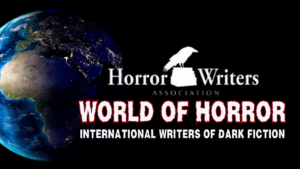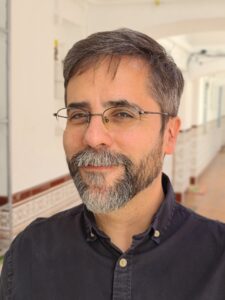World of Horror: Interview with Santiago Eximeno

Santiago Eximeno (Madrid, Spain, 1973) is a Spanish-genre writer who has published several novellas and collections, mainly horror literature. His work has been translated to English, Japanese, French and Bulgarian. His last book published in English is Umbría (Independent Legions Publishing, 2020). His short story, “Noverim Te,” was included in the 2019 Full recommended list (Best Horror of the Year volume Eleven) by Ellen Datlow.

Photographer’s Credit: María Jesús Ramiro
What was it about the horror genre that drew you to it?
Its power. Horror allows us to show the social reality of our world without limits. We can extrapolate real, everyday problems, playing with the fantastic, with the terrible, and in this way convey the message without falling into the obvious.
Is there a horror tradition in your country, in your culture? A taste for horror, a market? Not necessarily literature; perhaps oral tradition too.
Although it is usually said that there is no tradition of horror in Spain, the truth is that it is clearly shown both in the folklore of each region, rich in monstrous and terrible creatures, and in specific classic authors (for example, Gustavo Adolfo Bécquer). Now there is a market for horror created in Spain and with Spanish roots in all creative fields, from literature to videogames.
Who are some of your favorite characters in horror, internationally and/or in your own culture?
I adore when an author creates his own mythology and folklore in his narrations. Characters such as Pinhead and the cenobites are fascinating. All the creatures created by Clive Barker are amazing. “In the Hills, the Cities” is one of my predilect short stories of all times.
Do you make a conscious effort to include characters and settings from your country in your writing and if so, what do you want to portray?
Yes, I always say that I write about a non-me, a different person that is me but not. I write about strange realities where I use my life and my experiences to extrapolate social and relevant questions of my country through horror. I like to introduce Spanish folklore in my works too. By example, I have written a novel about the Caçamentides, a monstrous creature that forms part of the Catalonian folklore.
If you are not a native English speaker, but write in English, do you first think of horror in your native language or English? How do you draft them in your mind, in English or your mother tongue?
I usually write in Spanish. I have written some flash horror short stories directly in English, but I do not feel comfortable doing it. My English is not as good as I like it.
What has writing horror taught you about the world and yourself?
Horror is the engine that drives the world.
How have you seen the horror genre change over the years? And how do you think it will continue to evolve, both in the US and in your country?
Since Stephen King put the horror label on the shelves of bookshops, we have seen many changes in the genre in Spain. From the horror of the eighties, full of blood, gore, exploitation, slashers, and horror books for quick consumption, we have moved on to hybrid genres, to the appearance of new authors who are recognized by critics and, sadly, to that usual answer of “I don’t write horror,” as if accepting the label were a bad thing. I believe that there are new ideas, that there is also a horror that is not for internal consumption but that opens up to new readers and new spectators.
How do you feel the International horror writing community has been represented thus far in the market and what hopes do you have for representation going forward?
It could always improve, but I am happy as a horror author in today’s market.
Who are some international horror authors you would recommend?
There are great authors of horror literature in Spain who have hardly been translated into other languages: Alfredo Álamo, David Jasso, Ismael Martínez Biurrun, Nuria C. Botey, etc. And writing in Spanish we also have great Latin American writers: Samanta Schweblin, Mariana Enríquez, Solange Rodríguez Pappe, Mónica Ojeda, etc.
What is one piece of advice you would give horror authors today?
Enjoy writing. It’s essential. Don’t write anything that don’t make you happy.
And to the writers from your country out there who are just getting started, what advice would you give them?
Keep your jobs!



